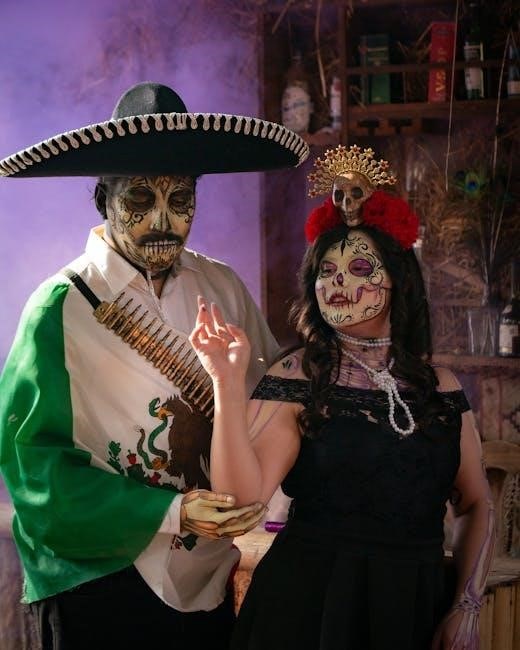The 10 Plagues hold profound spiritual significance‚ representing divine judgment and redemption. They symbolize humanity’s liberation from bondage‚ highlighting themes of faith‚ justice‚ and the triumph of God’s will. Each plague serves as a metaphor for spiritual awakening.
1.1. The Significance of the Number Ten in Biblical Numerology
In biblical numerology‚ the number ten symbolizes completeness‚ representing a fullness of quantity or a complete cycle. It often signifies divine order and perfection‚ as seen in the Ten Commandments‚ which embody moral completeness. The use of ten plagues in Exodus underscores a comprehensive judgment‚ reflecting God’s sovereign will to bring liberation and justice. This number emphasizes the idea of totality‚ ensuring that no aspect of Egypt’s oppression remained untouched. Each plague built upon the previous‚ escalating in severity to demonstrate the inexorable nature of divine justice. The number ten thus serves as a symbolic reminder of God’s ultimate authority and the completeness of His plan for humanity’s redemption. This numerical significance is deeply intertwined with the spiritual lessons embedded in the plagues‚ highlighting their enduring relevance for faith and understanding.
1.2. The Plagues as Spiritual Lessons for Humanity
The 10 Plagues serve as profound spiritual lessons‚ offering insights into humanity’s relationship with the divine. They symbolize the consequences of resistance to God’s will and the liberation that comes from surrendering to His plan; Each plague represents a specific spiritual principle‚ such as humility‚ faith‚ and the recognition of divine authority. The progression of the plagues‚ from mild to severe‚ teaches the importance of persistent repentance and the dangers of hardened hearts. They also illustrate the concept of spiritual awakening‚ where suffering can lead to enlightenment and redemption. Beyond their historical context‚ the plagues provide timeless moral and ethical guidance‚ encouraging humanity to reflect on its actions and align with divine truths. These lessons are universal‚ transcending cultural and temporal boundaries‚ making the plagues a rich source of spiritual growth and understanding for believers across generations.

The 10 Plagues: Spiritual Meanings and Symbolism
The 10 Plagues symbolize divine judgment and mercy‚ reflecting deeper spiritual truths. Each plague represents a specific moral or spiritual lesson‚ serving as a framework for understanding humanity’s relationship with the divine and the path to redemption.
2.1. The First Five Plagues: Representing Chaos and Disorder
The first five plagues—water turned to blood‚ frogs‚ lice‚ flies‚ and disease—symbolize the unraveling of Egypt’s order. Blood in the Nile‚ once a life-giving force‚ became a source of death‚ signifying corruption and spiritual decay. The frog infestation disrupted daily life‚ while lice and flies represented the breakdown of natural boundaries. Disease among livestock mirrored the moral sickness of Pharaoh’s resistance. These plagues revealed the chaos that ensues when humanity rejects divine authority‚ emphasizing the need for humility and surrender. They serve as a spiritual metaphor for the disintegration of systems that oppose justice and freedom. Through these plagues‚ God demonstrated His power to disrupt the status quo‚ urging humanity to reflect on its moral state and seek redemption. Each plague built upon the last‚ intensifying the call to acknowledge a higher power and align with divine will.
2.2. The Last Five Plagues: Symbolizing the Ultimate Surrender of Egypt
The last five plagues—boils‚ hail‚ locusts‚ darkness‚ and the death of the firstborn—represent Egypt’s complete surrender to God’s will. Boils afflicted both Egyptians and their animals‚ symbolizing the corruption of the flesh and the futility of resistance. Hail destroyed crops‚ undermining Egypt’s agricultural foundation‚ while locusts devoured what remained‚ leaving barrenness. The ninth plague‚ darkness‚ plunged Egypt into spiritual and physical blindness‚ mirroring Pharaoh’s hardened heart. The final plague‚ the death of the firstborn‚ struck at the heart of Egyptian society‚ breaking Pharaoh’s resolve. These plagues exemplify the devastating consequences of clinging to pride and rebellion against divine authority. They underscore the theme of surrender‚ as Egypt was forced to acknowledge the futility of opposing God. The progression of these plagues reveals a spiritual pattern: resistance leads to escalating judgment‚ culminating in the ultimate surrender of human will to the divine. Through these events‚ the Bible teaches the necessity of humility and obedience to God’s sovereignty.

The Connection Between the Plagues and Egyptian Gods
The 10 Plagues symbolize the defeat of Egyptian gods‚ challenging their perceived power. Each plague targeted a specific deity‚ such as Hapi‚ god of the Nile‚ and Osiris‚ god of fertility. This divine confrontation demonstrated God’s supremacy and the futility of idolatry‚ ultimately leading to Egypt’s spiritual collapse.
3.1. The Defeat of Egyptian Gods Through the Plagues
The 10 Plagues were not only physical punishments but also a spiritual confrontation with Egypt’s pantheon of gods. Each plague targeted a specific deity‚ undermining their perceived power. For instance‚ the Nile turning to blood humbled Hapi‚ the spirit of the river‚ and Khnum‚ the god of water sources. Similarly‚ the death of the firstborn sons struck at Osiris‚ the god of resurrection‚ and Isis‚ the protector of children; By defeating these gods‚ the Plagues demonstrated the futility of idolatry and the supremacy of the one true God. This divine judgment exposed the weakness of Egypt’s spiritual system‚ leading to a collapse of their religious and cultural framework. The Plagues thus served as a powerful lesson in monotheism‚ showcasing God’s authority over creation and humanity. This spiritual dimension remains central to the enduring significance of the Plagues in religious thought and reflection.

The Historical Accuracy of the 10 Plagues
The historical accuracy of the 10 Plagues is debated‚ with the biblical account offering a powerful narrative. However‚ direct historical evidence remains elusive‚ leaving scholars to argue over its credibility as a literal or symbolic event.
4.1. Biblical Account vs. Historical Evidence
The biblical account of the 10 Plagues is rich in detail‚ describing a series of miraculous events that devastated Egypt. However‚ historical evidence supporting these events is scarce. Archaeological records from ancient Egypt do not explicitly mention the Plagues‚ leading scholars to question their historicity. While some researchers suggest that natural phenomena could explain the Plagues‚ such as volcanic eruptions or environmental disasters‚ these theories remain speculative. The biblical narrative serves primarily as a spiritual and theological text rather than a historical chronicle. Its focus is on the divine message of liberation and redemption rather than providing a verifiable historical account. As a result‚ the debate between faith and historical evidence continues‚ with each side offering unique perspectives on the significance of the Plagues.
The Modern Interpretation of the 10 Plagues
Modern interpretations of the 10 Plagues explore their relevance to contemporary spirituality and psychology. They are often seen as metaphors for personal struggles and inner liberation‚ offering timeless lessons on faith and transformation.
5.1. The Link Between the Plagues and the Enneagram System
The Enneagram‚ a psycho-spiritual system‚ offers a modern lens to interpret the 10 Plagues. Each plague can be seen as a reflection of the nine core Enneagram types‚ symbolizing humanity’s inner struggles and divine intervention.
The 10 Plagues remain a profound symbol of divine redemption and spiritual transformation. They teach humanity about the consequences of resistance to God’s will and the importance of humility. Each plague‚ in its unique way‚ reflects a deeper truth about human nature and the need for surrender.
By examining the plagues through a spiritual lens‚ we uncover universal lessons that transcend time and culture. They remind us of the importance of faith‚ justice‚ and the pursuit of freedom. The plagues also invite us to reflect on our own inner struggles and the process of spiritual awakening.
Ultimately‚ the story of the 10 Plagues is not just a historical account but a timeless allegory for personal and collective transformation. It encourages us to seek redemption‚ embrace humility‚ and align ourselves with the divine plan. These lessons continue to inspire and guide humanity in its spiritual journey.
